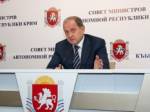Engineering Conflict in the Crimea


Anatoly Mohylyov Mustafa Dzemiliev
In 2008 the Russian – Georgian war over South Ossetia prompted a surge of international interest in the Crimea. The media found any number of analysts, competent and otherwise, to consider whether the Crimea “could be next”.
Attention waned, as it does, and by 2010 relatively little attention was paid to the extremely specific problems of this autonomous republic within Ukraine. That situation needs to change now before the Crimean leadership, almost certainly with encouragement from above, unleashes conflict of potentially tragic consequences.
The latest remarks from Anatoly Mohylyov, Prime Minister of the Crimea, are in no way out of character. This is, in fact, the problem. President Yanukovych was well aware of Mohylyov’s rabid hate speech directed against Crimean Tatars and role in the gratuitously violent confrontation on Ai-Petri plateau in the Crimea on 7 November 2007 when he appointed him Interior Minister in March 2010, and then promoted him to top post in the Crimean leadership in November 2011.
Examples of how both Kyiv and the peninsula’s leaders have been edging out the Mejlis of the Crimean Tatar People and bringing in others, either antagonistic to the Mejlis, or generally more malleable can be found here.
As reported, the Simferopol authorities are refusing to work with the Mejlis in coordinating the remembrance events on 17 and 18 May commemorating the Deportation of the Crimean Tatar People by Stalin’s regime in 1944. Tens of thousands of Crimean Tatars and other Ukrainians gather each year to honour the memory of the victims of that crime. Last year’s ceremonies were attended by many former Soviet political prisoners and – for the first time – totally ignored by the peninsula’s leaders.
Any doubts regarding the real driving force behind the Simferopol authorities’ sudden wish to coordinate the remembrance events they ignored last year with highly marginal groups and exclude the Mejlis were dispelled on 12 March. At a press conference, Crimea’s Prime Minister Mohylyov had the following to say:
“The Mejlis is a structure outside the legal framework in Ukraine. I am ready to cooperate with MP Dzemiliev and Member of the Crimean Parliament Chubarov [Mejlis Head and Deputy Head, respectively - HC] however let’s get rid of this word Mejlis.”
Since1991 when newly independent Ukraine encouraged the Crimean Tatars deported in 1944 to return to their native Crimea, the Mejlis has been the representative executive body elected by the Crimean Tatar Kurultai [National Congress], of the Crimean Tatars who now constitute around 12% of the Crimea’s population.
Mohylyov is well-aware that the lack of official recognition for the Mejlis has long aroused concern, and by no means only in Ukraine. The lack of de jure status does not diminish the standing of the Mejlis, and his attempts to “remove the word” or present the Mejlis as an outlaw organization will not wash.
Mustafa Dzhemiliev is convinced that Mohylyov is simply carrying out President Yanukovych’s instructions. He believes that the latter has it in for the Mejlis both because it acts as an autonomous body, and because it has in recent years supported parties and candidates in opposition to Yanukovych.
With the EU-Ukraine Association Agreement in jeopardy most particularly over selective prosecutions of opposition leaders, such extraordinary short-sightedness does not seem improbable.
It remains extremely hazardous. Predictions of confrontation during the remembrance events on 17 and 18 May are entirely realistic. The Verkhovna Rada Committee on National Minorities has called on the President to intervene, but Dzemiliev, a member of the committee is not optimistic.
On 9 May 2010, shortly after the change in regime, there were at very least no attempts made to prevent clashes in Lviv between communists and nationalist groups. Many observers and analysts believed the confrontations to have been positively encouraged.
In the present situation, it is clear that the Simferopol authorities’ position, now effectively endorsed by Mohylyov, is likely to end in bloodshed.
With Ukraine holding the chairmanship of the OSCE at present, it would seem appropriate for that body as well as other international structures to remind Ukraine’s leaders of the country’s commitments and of the grave dangers of fuelling conflict and enmity in the Crimea, whether to settle personal scores or for other questionable motives.





